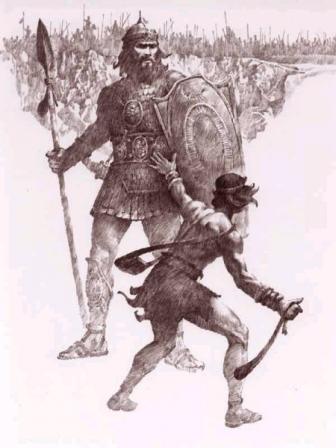
by Dr. David Dyson and Col. Stretch Dunn (USA Ret)
When people set resolutions at New Years or other times of inspiration or decision, the solutions usually require action though often we overlook the requirement to address our beliefs that either support or sabotage our success. “Moral injury” is one of the sources of setback for many people, perhaps most, especially for veterans of war.
When people seek to “be, know, or do” better we often have to face barriers that hold us back. If you have been setting the same New Year Resolution for years, you likely have a barrier holding you back from following through or even starting. Sometimes, between us and our goal stands a “Goliath” threatening us and those influenced by us. Some Goliaths we created and some happened to us, though in either case we can achieve breakthroughs by facing our barriers and deciding how our best-selves can make the best of situations and grow from challenges.
An example of a big barrier is when a veteran of combat faces feelings and beliefs from “moral injury” created having to kill another human being. Many veterans who return home face challenges to re-enter society. Some feel sad. Some feel guilty. Some feel they do not deserve better than their despair. They have been morally injured and need healing.
Some stay in their despair. Some “hold it in” and “others talk about it” with their buddies. Time might help to process and heal, though this often is a slow approach and there is no guarantee of recovery.
Those who act with intentionality are more likely to achieve not only recovery to a state prior to the trauma or injury but also “post traumatic growth.” For more on PTG, read Dr.Seligman’s work.
I asked Col. Stretch Dunn (USA Retired), West Point graduate, combat leader in Vietnam, founder of the Veterans Leadership Ministry, and co-author with me of Professionalism Under Stress, to provide his answer to the question from veterans struggling with psychological wounds of warfare.
Question: What can I do if I feel shame from killing that holds me back?
I was asked recently by a vet suffering the pain of “moral injury” a question tied to his feeling of shame. He still struggled with the commandment to “not kill” and his having to do so back in Vietnam. My response was one that has worked for me since I faced that dilemma in 1968.
Captain Dunn 1968, Vietnam
I never forget the capacity of our minds to rationalize anything. The treasure of being able to think is truly amazing.
That said, I live with my past by listening to the intent of the heart. Matthew 15:19 reminds me, murder comes from “evil in the heart.” While there is a moral imperative to not kill unlawfully, there is also the soldier’s duty to protect. The noble warrior punishes in proportion to the gravity of the offense.
So I told him I sought to “put on the whole armor of God” and do what had to be done to protect the innocent or my buddies in keeping with the oath I took in 1966 and the heart of a Noble Warrior.
Col. C.H. “Stretch” Dunn (USA Retired)
Veterans Making Comebacks Planbook
When writing the book, Professionalism Under Stress, with Col. Dunn, he introduced me to the meaning of a “least-worst option.” As the name suggests, all the options seem bad; the best option is the “least-worst.”
Killing the enemy is bad; the enemy killing your buddies or U.S. civilians is worse. Choices like these, tough choices, can stay with you for years in a negative way unless you process them in to your “best possible” way.
Callings and Choices are a key to a best-self leader.
Asking, God, what would you have me do? following by asking myself, Now, what would my best-self do? helps me move from thinking of bad memories to thinking of potential good solutions. The thoughts and actions that must follow can heal, inspire, and make you stronger than before your moral injury. May your thoughts carry you upward, David`








You must be logged in to post a comment.